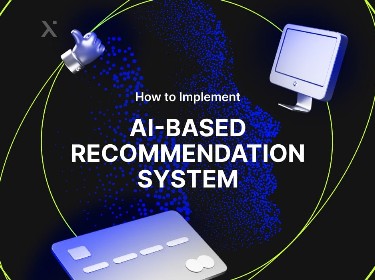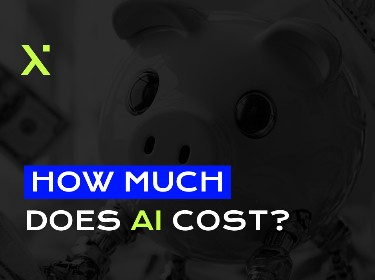From investment decisions to enhanced efficiency, ML in FinTech is gaining more and more popularity. And since many financial institutions have invested heavily in deploying machine learning technology, is it a pairing made in financial heaven?
Machine learning can be viewed as a key ally in the financial sector’s continuous pursuit of technological innovation. The industry’s complex financial models and extensive datasets are ideally suited to leverage the advanced capabilities of machine learning for groundbreaking projects and solutions.
The ProPool project exemplifies the effective integration of technology and finance. Our machine learning development team transformed mining resources into a virtual computation cluster for machine learning activities. This innovative approach boosted profitability by 80-100 times and opened new avenues for miners to engage in machine learning tasks and diversify their sources of income.
And yet, the applications and use cases of machine learning in FinTech are much more diverse.
In this article, we will explore the top 7 fintech use cases for machine learning, delving into how these technologies are not just reshaping the financial landscape, but also opening up a myriad of possibilities for innovation in the sector.
![]()
Top 7 FinTech use cases of machine learning
FinTech companies can use AI and ML to provide customer-centric services in line with changing market trends. In particular, the top use cases for machine learning in FinTech include:
- Machine learning and algorithmic trading
- Machine learning and fraud detection and prevention
- Machine learning for regulatory compliance
- Machine learning for better customer service
- Machine learning in the stock market
- Machine learning for loan automation
- Machine learning for data analytics and decision making
Let’s get into the detail.
![]()
#1 Machine learning and algorithmic trading
Algorithmic trading is a highly effective strategy used by many companies to automate their financial decisions and increase the volume of trades. It involves executing trading orders in line with pre-programmed trading instructions created using machine learning algorithms. Every major financial company invests in algorithmic trading, as the frequency of trades executed by ML technology would be impossible to replicate manually.
For example, 8topuz uses ML algorithms and AI to help investors grow their wealth. The company provides an automated trading system powered by artificial intelligence solutions. By using ML algorithms to analyze massive sets of historical data from different stock markets, 8topuz helps investors design better algorithmic trading strategies.
#2 Machine learning and fraud detection and prevention
PwC’s Global Economic Crime and Fraud Survey revealed that 46% of surveyed organizations encountered fraud, corruption, or other economic crimes in the past 24 months. This highlights the need for effective solutions like machine learning fraud detection.
Sophisticated deep learning models, armed with vast data sets, enable organizations to uncover hidden relationships between data points and swiftly identify anomalies.
For instance, Danske Bank, a major bank in Denmark, made a significant shift from its legacy rule-based system to a machine learning fraud detection approach. This change led to a 60% reduction in false positives and a 50% increase in fraud detection, demonstrating the efficacy of machine learning in combating financial fraud.
Check out one of our recent success stories – an intelligent platform that leverages ML for analytical purposes and helps NFT enthusiasts avoid fraud
#3 Machine learning for regulatory compliance
Among the top machine learning use cases in finance are Know Your Transaction and Regulatory Technology (RegTech) solutions.
Because ML algorithms can read and learn from a pile of regulatory documents, they can detect correlations between guidelines. As a result, cloud solutions with ML algorithms integrated for use in finance can automatically track and monitor regulatory changes as they occur.
Moreover, banking institutions can also monitor transaction data to identify anomalies. In this way, ML can ensure that customer transactions comply with regulatory criteria.
#4 Machine learning for better customer service
Personalization is key for building customer trust and loyalty, especially in finance where transparency and accuracy are highly valued. Machine learning in fintech plays a pivotal role here, as it can analyze customers’ data to predict services they might like or offer helpful advice. This technology is also instrumental in customer churn prediction as it helps businesses understand and retain their customers.
Moreover, the remarkable advancements in natural language processing have enabled fintech companies to engage with AI chatbot development services and employ intelligent chatbots for resolving customer issues. These advanced chatbots go beyond answering basic queries. They now offer more personalized and insightful financial advice, adding another dimension to customer service in the fintech industry.
Explore our comprehensive guide on customer sentiment analysis to understand how and why its implementation can benefit your business
#5 Machine learning in the stock market
The vast volumes of trading operations generate tons of historical data, providing unlimited learning potential. However, historical data is merely the grounds on which predictions are made.
ML algorithms analyze data sources available in real time, such as news and trade results, to identify patterns explaining stock market dynamics. Traders are then tasked with deciding which ML algorithms to include in their strategies when making a trading forecast, and selecting a behavioral pattern.
Have you heard about MLOps? Read our article to find out what it is and what benefits it brings to software development
#6 Machine learning for loan automation
Machine learning algorithms manage to process more layers of data without being limited to FICO scores and income data. This opens exciting possibilities for metaverse development services for the fintech industry. Imagine a virtual bank branch in the metaverse where users can interact with AI-powered loan officers and access personalized financial advice in a 3D environment.
Such applications of machine learning in finance have opened alternative data sources to lenders. For example, many diverse indicators are now being considered to establish an accurate risk score — from social profiles, telecommunications companies, utilities, rent payments, and even health checkup records.
Algorithms compare aggregated data points with thousands of customers to generate an accurate risk score. A loan will be issued automatically if the risk score falls below the lender’s threshold.
Importantly, machine learning algorithms can evaluate borrowers without emotion or bias, unlike human credit assessors. According to the Harvard Business Review, financial companies can make lending more equitable by removing racial, gender, and other biases from the models when they are being developed.
Learn the essentials of creating a strong peer-to-peer lending application through our detailed blog guide
#7 Machine learning for data analytics and decision making
Machine learning in fintech offers a robust solution for handling and interpreting extensive amounts of data. By integrating data analytics services, it delivers thoroughly analyzed insights that enable real-time decision-making, saving both time and money. This technology also enhances the accuracy and speed of predicting future market trends.
Moreover, by leveraging predictive analytics solutions, fintech companies can develop innovative and future-ready solutions tailored to the evolving demands of customers and market trends. This proactive approach, powered by the synergy of machine learning and data analytics services, positions fintech firms to effectively anticipate and meet emerging financial needs. This is where mobile development services for the fintech industry become essential, as they can translate these insights into user-friendly and accessible mobile applications that deliver personalized financial services to customers.
Does your business need to implement machine learning into its financial operations?
Absolutely, and here’s why your organization should consider this adoption.
Machine learning offers robust data processing capabilities that are crucial for handling the vast amounts of information typical in finance. ML also streamlines operations by automating routine tasks and analyzing trends, which can enhance decision-making and risk management.
Machine learning in FinTech can be also used in document management to automate tasks such as data extraction, classification, and validation, reducing manual effort and minimizing errors. By applying ML algorithms, FinTech companies can process large volumes of documents quickly and accurately, enabling more efficient workflows. Blockchain adds an extra layer of transparency and security by ensuring that all document interactions are immutably recorded, reducing fraud. Our DocFlow solution is a prime example of a blockchain-powered document management system, providing both automation through machine learning and enhanced transparency through blockchain technology.
Furthermore, tokenization services for the fintech industry can revolutionize asset management, enabling fractional ownership and increasing liquidity for a variety of financial instruments.
Besides, financial institutions using machine learning can better detect and prevent fraud, tailor financial products to individual customer needs, and improve overall efficiency.
Therefore, adopting machine learning in financial workflows is a forward-thinking step that is very much needed for staying relevant in a rapidly evolving digital financial landscape.
Planning to develop your next FinTech project? Check out our financial software development and consulting offering
Closing thoughts
To fully realize the potential of machine learning in fintech and successfully meet future demands, embracing restructuring, redefinition, and adaptability becomes essential.
As a leading machine learning consultancy firm, PixelPlex offers an ideal starting point in the shift from traditional to digital finance.
Our early recognition and harnessing of fintech tools’ transformative impact have equipped us with deep expertise. We have developed the ability to tackle a wide range of financial challenges, devise legitimate strategies, and create purpose-driven solutions. From delivering computer vision services and solutions to implementing ML algorithms to detect fraudulent transactions, we can assist you with solving any challenge.
Moreover, we engineer our own in-house products for businesses in the financial sector. Recently, we developed our proprietary solution, OTC Hawk, which addresses practical issues for banking and finance-related businesses at scale.
Whether you are a newcomer to fintech or an established banking giant, PixelPlex is ready to assist you in managing your financial operations with sophistication and innovation. Our team will deliver efficient research and development services helping you seamlessly integrate ML-powered solutions into your business processes.




